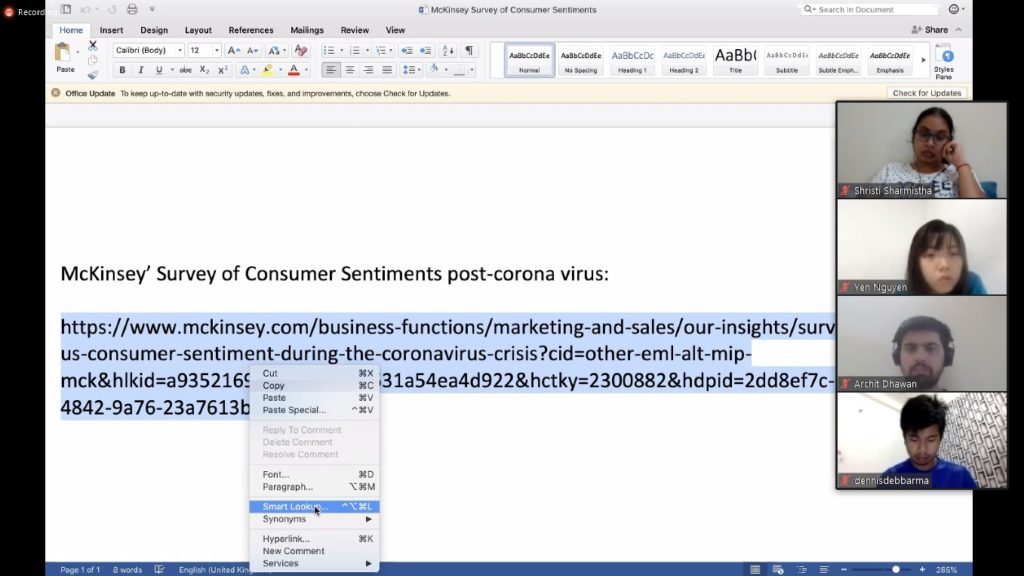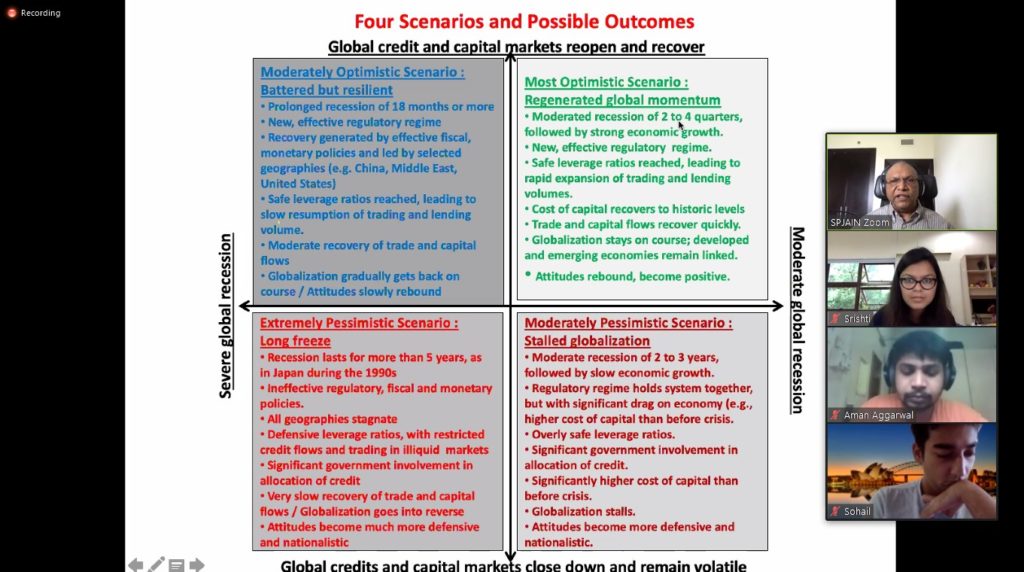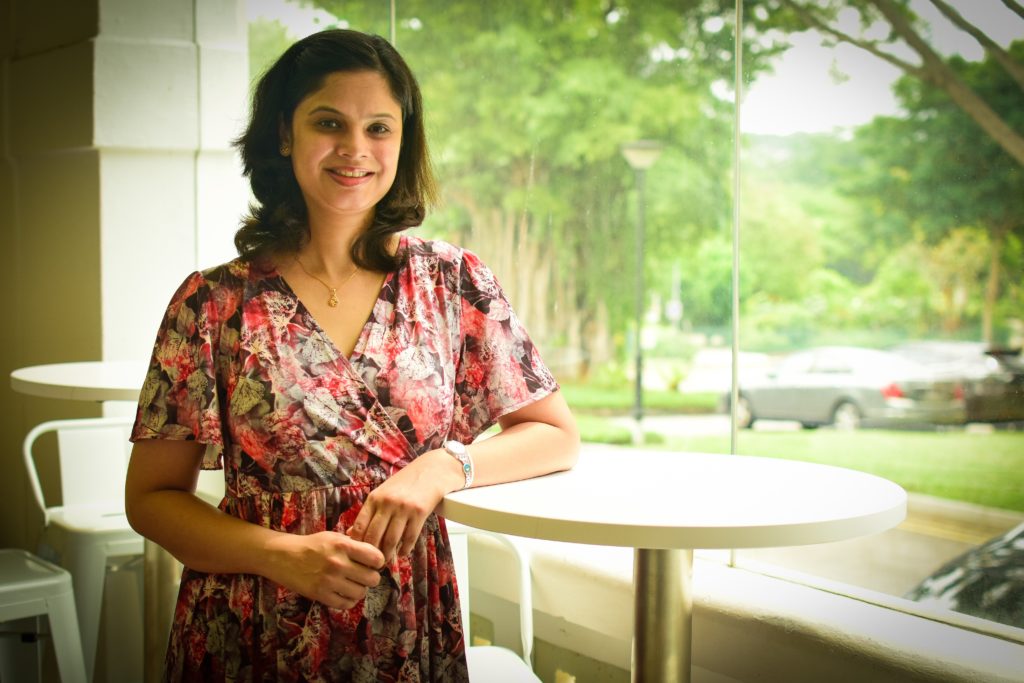‘What if Analysis’: An Imperative To Cope With An Uncertain Future
Are we all moving towards a new way of life with COVID19? The answer is a big YES. So, what?
This write up focuses on the impact of the Pandemic, and the way companies should prepare to adapt to changing needs of consumers. What If analysis, an approach that focuses on possible outcomes under varying scenarios, can be helpful to companies to critically think and evolve strategies to cope with ambiguity and prepare for an uncertain future. This practice has become an imperative learning and is applied in real-life industry projects at S P Jain School of Global management.
Since Jan.’20, COVID-19’s severity is felt in numerous sectors of the economy. The Pandemic, initially thought to be contained to China, gradually made its way to every corner of the world. The health crisis has led to social distancing, business & factory closures, massive lay-offs, cancellations of major events/gatherings, travel restrictions[1] etc. resulting in lockdowns causing a havoc to economies and financial markets. The most noticeable impact can be seen on buyers’ psychology.
How is a consumer reacting to the present situation?
A McKinsey Report on forecasting demand under COVID19, explains that businesses must adapt to changes caused by the virus by tracking consumer behavior. Understanding the shift in buying habits and sentiments is essential to deal with the aftermath and stay resilient. Increasing under-employment and unemployment are shrinking the finances of individuals and families, and thus their purchase routines[2].

How can one prepare to cope up with the Virus-related ambiguity?
What if analysis (also popularly known as What if?) can help companies assess and prepare for the aftereffects. This approach suggests they consider a range of scenarios, possibly four:
1) most optimistic scenario: involves a positive thought of regenerating global momentum and suggests being hopeful and positive about the present situation. It assumes that consequences of the pandemic will last no longer than perhaps 2-4 quarters
2) moderately optimistic scenario:includes a thinking that is battered but resilient, where we may want to assume that the aftermath of COVID19 may prolong for 18 months or more
3) moderately pessimistic scenario: where one takes a conservative approach and assumes that the recession caused due to pandemic may last up to at least 2-3 years, and
4) extremely pessimistic scenario: which alerts us to prepare for a meltdown of 5 years or longer.

Considering varying scenarios, businesses can critically analyze the business environment and build a contingency strategy for each context. This will help one to assess changing spending patterns to work on business plans and initiatives necessary for a rapid recovery of revenues, cash flows and profits.
‘What if Analysis’ for a leading Southeast Asian Airline:
Given the restrictions on travel and aviation industry due to COVID19, a student team at SP Jain School of Global Management engaged in a real-life industry project for a leading airline in Southeast Asia. This regional carrier belongs to a country that has successfully managed the spread of virus limiting its impact to a minimal. The team was made up of final term students of the Master of Global Business: Ms. Chau Minh Luu, Ms. Linh Nhat Nguyen, Ms. Shristi Sharmistha and Ms. Yen Bao Thi Nguyen.
Recent Study shows that many who planned their vacation have deferred it indefinitely. Business meetings have gone virtual These trends have a huge negative impact on the revenues of aviation and hospitality industries. Experts view that anxiety of some may not fade away anytime soon, while others may be resilient to go back to normal life and travel in the near future. It depends on how optimistic or pessimistic a traveler is, and whether and when they are ready to travel[3].
Using What if analysis, the team developed strategies for to deal with crisis in two phases:
1)‘during the crisis’ phase, and 2) the ‘transition’ phase.
Focusing on cost cutting by suspending international flights and adopting a low-cost carrier model were considered as some of the effective ways to deal with the crisis. The transition phase would demand cost optimization by initiating simple steps like suspension of serving water and in-flight meals, salary reduction, and offering gifts of appreciation to keep employee motivation high. Other avenues considered were fleet optimization and building customer confidence, such as taking care of hygiene and leaving middle seats empty in economy class. Being generous with loyalty points, extension of memberships and building revenue-based loyalty programs were considered to help the Airline to slowly recover their business and cash flows.
The team built a customer centric strategy considering alternate scenarios, and performed a what if analysis upon gathering sentiments by understanding travelers’ minds. The number of travelers witnessed a large drop from January to April 2020. No travelers in April due to travel restrictions imposed. The situation was expected to remain the same in June.
In the optimistic scenario, flights were assumed to resume from July. The number of travelers were expected to gradually increase as they gain confidence to travel. Under pessimistic scenario, the very severe situation would extend travel restrictions across countries, thus there will be no travelers from April to September. Flights were assumed to resume from October, with the number of travelers growing very slowly, most of them flying domestic. Overall, compared to the optimistic scenario, the number in this pessimistic scenario was expected to fall even greater.
Using the Customer Life Time Value (CLTV) framework in tandem with a what if analysis, the team assessed possible trends for the airline under study and their impact. The recommendations and contingency plans, supported by exhaustive analyses, were greatly appreciated by the senior management of the Airline.
In brief, the student team recommended that the Airline should develop strategies in the three phases:
- During the crisis: focus on fleet optimization and cutting costs
- Transition phase: boost customer’s confidence to fly
- New normal: upgrade technology for enhancing customer experience.
An Imperative Learning @ S P Jain School of Global Management
What if analysis is now mandatorily adopted by the students at SP Jain school of Global Management in their industry projects. The approach has been extremely helpful in honing students’ skills to craft possible scenarios and assess likely outcomes. This has enhanced their business acumen to cope with ambiguity, by engaging in complex decision making and strategizing contingent plans for an uncertain future.
About the authors:
Dr. Balakrishna Grandhi, Dean – Global MBA & MGB, Area Head and Professor (Marketing & Strategy)

Dr Balakrishna Grandhi is the Dean – Global MBA & MGB, Area Head and Professor (Marketing & Strategy) at SP Jain School of Global Management. He is a member of the core team and the Academic Board governing the School. He has a passion to build teams for delivering high impact learning.
A PhD and MBA from Carlson School of Management (US), Dr Grandhi has over four decades of experience in industry and academics, as a teacher/consultant/entrepreneur/practitioner, from across the US, Canada, Dubai and India. He is also a member of the American Marketing Association (AMA), a Fellow of Chartered Institute Marketing (UK) and Country Director of UAE for EuroMed Research Business Institute.
Dr Grandhi is a recipient of the Doctoral Research Grant from the AMA in 1976. For his PhD program, he was awarded Medical Data Reports Inc fellowship and Jack L Hurley grant.
His interests include Strategic Marketing, MARKSTRAT, Marketing Analytics, B2B Marketing, Blue Ocean Strategy, Customer and Product Portfolio Management and Strategic Retailing.
Dr. Girija Shawarikar, Academic Manager (Finance)

Dr. Girija Shawarikar is an Academic Manager (Finance) at SP Jain School of Global Management (Singapore). She is a PhD in Behavioural Finance from RMIT University (Melbourne, Aus.) and has 9+ years of experience in teaching and research. Her interest lies in studying human behaviours and her PhD involved a detailed study of cognitive science and heuristic driven behavioural biases. Her teaching experience includes subjects in the area of Economics, Finance and Accounting in institutions across India, Australia and Singapore. At SPJ, she is a mentor and supervisor for academic and industry research projects conducted by management students from Master of Global Business, Master of Business Administration (Global), Executive MBAs, and Doctor of Business Administration (DBA) courses. Before joining academia, she has briefly worked with a leading banking and insurance company in India.
Ms. Irina Pismennaya, Instructor and Senior Manager Academics (Marketing)

Ms. Irina Pismennaya is an Instructor and Senior Manager Academics (Marketing) at SP Jain School of Global Management (Singapore). She is an MBA Degree Holder with major in Strategic Management and minor in International Business from Sauder School of Business, University of British Columbia (Vancouver, Canada) and has 15+ years of experience in marketing and research. Her interest lies in studying consumer behavior, B2B marketing and marketing research. At SPJ, she is a mentor and supervisor for academic and industry research projects conducted by marketing specialization students from Master of Global Business, Master of Business Administration (Global) and Executive MBAs programs. Before joining academia, she has worked for a leading US-based high-performance specialty alloys manufacturer in Singapore.
Would you like to read more articles from the SP Jain community? Click here.
[1] Ozili, P. K., & Arun, T. (2020). Spillover of COVID-19: impact on the Global Economy.
[2] https://www.mckinsey.com/industries/consumer-packaged-goods/our-insights/rapidly-forecasting-demand-and-adapting-commercial-plans-in-a-pandemic
[3] https://www.scmp.com/economy/china-economy/article/3077901/coronavirus-china-us-consumer-behaviour-radically-altered




